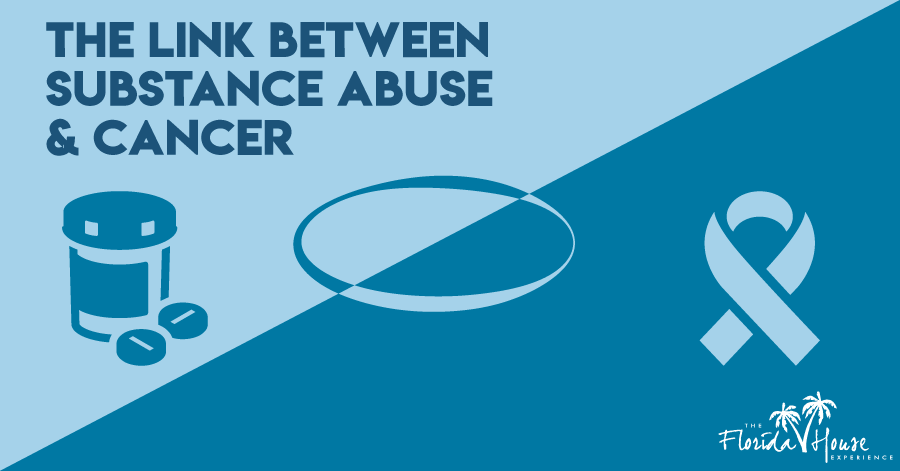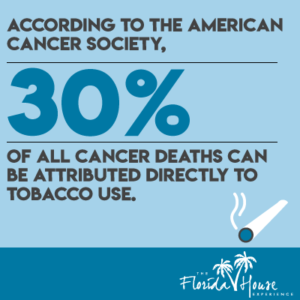
Cancer is currently one of the leading causes of death in the United States, and there are no signs of this trend slowing down. Nearly 70 million people received a cancer diagnosis in 2016 with breast, lung, prostate, colon, or bladder cancer being the most common forms. Unfortunately, with the way things are going in our country, about 40% of all US citizens will be diagnosed with some form of cancer in their lifetimes. With such a high percentage, it is certainly important to consider various possibilities for what may be causing such a high percentage of cancer cases today.
Many have sought to understand if there is any type of correlation between substance abuse and cancer with varying conclusions. Could increased exposure to drugs and alcohol be the leading cause of the rise in cancer diagnoses in the US? Primary risk factors for cancer are diverse and can include age, family history, diet, and sun exposure, yet it seems that new carcinogens are discovered each year. So how does substance abuse come into play when determining the likelihood of an individual to receive a cancer diagnosis in their lifetime?
The Relationship Between Substance Abuse and Cancer
It is an interesting inquiry to consider whether substance abuse is linked with the development of cancer in many individuals. After all, those struggling with alcoholism and addiction tend to introduce their bodies to all forms of dangerous substances and chemicals in pursuit of altering their state of mind. Surely this exposure to dangerous chemicals and toxins has some effect on developing cancer cells in the body.
In some cases, this harmful substance exposure is deliberate in order to chase a high, yet in others, it is merely a byproduct of a life that for the most part disregards the consequences of their actions on their long-term health. Step inside a drug treatment facility or your nearest AA/NA/etc. meeting and you are sure to find a significant number of people smoking cigarettes or using vaping alternatives. So how does this behavior translate into an individual’s greater susceptibility for developing cancer?
 Tobacco – Unfortunately, tobacco is a leading cause of cancer-related deaths in the United States. According to the American Cancer Society, approximately 30% of all cancer deaths can be attributed directly to tobacco use. It is the cause of 87% of lung cancer fatalities in men and 70% in women. Though many believe tobacco use only impacts the lungs, there are additional forms of its use including chewing tobacco and snuff which impact other parts of the body as well. This includes the mouth, throat, larynx, esophagus, stomach, colon, rectum, pancreas, liver, kidneys, bladder, cervix and the blood. The majority of tobacco-based products are made up of a vast array of different chemicals that give it the flavor and experience users enjoy, but equally the ingredients for a number of different forms of cancer.
Tobacco – Unfortunately, tobacco is a leading cause of cancer-related deaths in the United States. According to the American Cancer Society, approximately 30% of all cancer deaths can be attributed directly to tobacco use. It is the cause of 87% of lung cancer fatalities in men and 70% in women. Though many believe tobacco use only impacts the lungs, there are additional forms of its use including chewing tobacco and snuff which impact other parts of the body as well. This includes the mouth, throat, larynx, esophagus, stomach, colon, rectum, pancreas, liver, kidneys, bladder, cervix and the blood. The majority of tobacco-based products are made up of a vast array of different chemicals that give it the flavor and experience users enjoy, but equally the ingredients for a number of different forms of cancer. - Alcohol – Resources such as the National Cancer Institute indicate that approximately 3.5% of cancer deaths annually stem from heavy alcohol use – more than 4 drinks per day/14 per week for men, and more than 3 drinks per day/7 per week for women. Those who are consuming this level of alcohol or more should seek substance abuse treatment immediately as continued abuse increases their likelihood for contracting liver cancer, esophageal cancer, head and neck cancers and even breast cancer. Additionally, alcohol significantly contributes to poor diet and empty calories that cause obesity; another risk factor for cancer, and another connection between substance abuse and cancer.
 Anabolic Steroids – Many patients entering into substance abuse treatment suffer from both addictions and self-esteem issues. Many times, we find those new to recovery are quick to implement a strict gym routine into their program to enhance their physical appearance in the hopes of strengthening their personal confidence. As addicts tend to take all things to extremes, we find that some go as far as to introducing anabolic steroids into their regiments to enhance the effects of their workouts. While many recovering individuals are instructed while at substance abuse treatment programs that anabolic steroids are detrimental to their recovery, there is much controversy on the subject that results in individuals choosing to neglect this advice. Anabolic steroid abuse has a significant impact on the liver and puts the user at risk of liver tumors, adenomas, peliosis hepatitis and an increased chance for prostate cancer, further drawing a connection between substance abuse and cancer.
Anabolic Steroids – Many patients entering into substance abuse treatment suffer from both addictions and self-esteem issues. Many times, we find those new to recovery are quick to implement a strict gym routine into their program to enhance their physical appearance in the hopes of strengthening their personal confidence. As addicts tend to take all things to extremes, we find that some go as far as to introducing anabolic steroids into their regiments to enhance the effects of their workouts. While many recovering individuals are instructed while at substance abuse treatment programs that anabolic steroids are detrimental to their recovery, there is much controversy on the subject that results in individuals choosing to neglect this advice. Anabolic steroid abuse has a significant impact on the liver and puts the user at risk of liver tumors, adenomas, peliosis hepatitis and an increased chance for prostate cancer, further drawing a connection between substance abuse and cancer.- IV Drugs – Illicit substances are consumed in a variety of ways; however we have seen a correlation in the rising death toll among addicted persons and the increased use of needles for getting high. Hepatitis B and Hepatitis C are the primary culprits of disease from the sharing of needles. Without the appropriate medical treatment, these illnesses can ultimately progress to cirrhosis, a specific form of liver cancer known as hepatocellular carcinoma. Liver cancer leads to more than 20,000 deaths annually in the United States alone.
Is There a Correlation Between Substance Abuse and Cancer?
At a bare minimum, we can conclude that individuals struggling with substance abuse place themselves in positions that increase the likelihood of contracting some form of cancer. There is a clear correlation between all substances used to achieve and sustain a level of high that make for the individual to be exposed substantially more to cancer-producing substances than the average individual.
Most patients in substance abuse treatment tend to consume tobacco and nicotine products in some form or another. Many choose to smoke, vape, or chew tobacco in order to help relieve the initial withdrawal symptoms and mental obsessions that can lead to a relapse. Many in the recovery community tend to support the temporary use of nicotine in order to tackle the addictive behavior putting the individual in an immediate risk for fatal harm from their disease and prefer to return to the subject later on in the process when they are better mentally and emotionally fit to navigate it. The issue with this is obviously the link between substance abuse and cancer, as we have seen that tobacco products are the leading substance to cause cancer in addicted individuals.
Alcoholism, in particular, has been found to have a significant correlation to cancer-based on the poisonous structural makeup of the liquid and its impact on the primary physical functions that digest it. Alcoholics also tend to regularly combine their drinking with tobacco use. For those heavy drinkers with prolonged histories of use, they are the most susceptible to various forms of liver cancer, in addition to kidney damage. This correlation between alcohol substance abuse and cancer should not be taken lightly.
Anabolic steroids are a gray area in the recovery community and thus are often found to be justified by many seeking to enhance their physical features to overcome self-esteem issues. In addition to putting this desire for physical achievements ahead of their overall recovery which increases their likelihood of a relapse, the steroids themselves pose a number of physical problems that can lead to cancers of the liver. Similar to IV drug use including heroin, cocaine, and methamphetamine, those sharing needles for injecting these steroid drugs increase the likelihood of contracting Hepatitis B and C which can lead to a form of liver cancer known as hepatocellular carcinoma.
If you or a loved one are struggling with alcoholism and drug addiction and need help to quit, please do not hesitate to call Florida House today at (833) 596-3502! Your drug and alcohol use put you at an exponentially greater chance of developing various forms of cancer that can be fatal even after you get sober. Do not wait any longer to get help. Call today, and let us walk with you on your journey to freedom.






